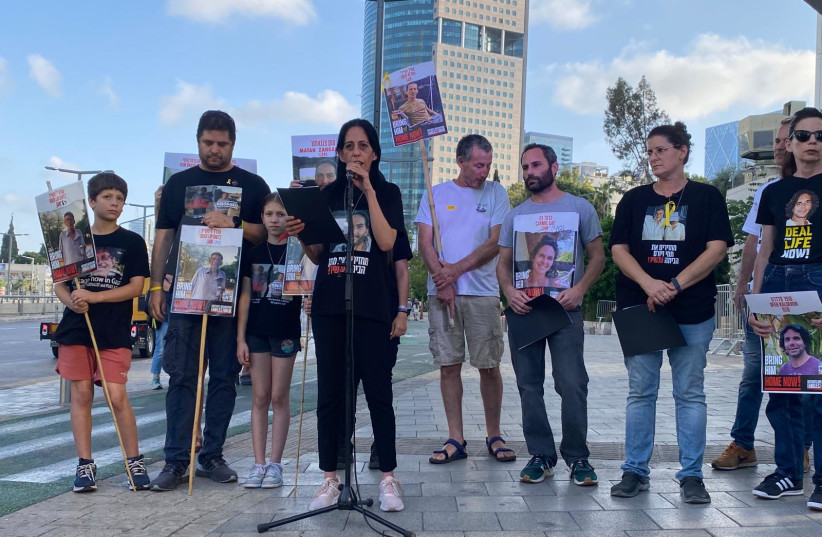Where there is anger, there is pain underneath. Angry and hurt protesters took to the streets in many cities on Saturday night across the country, demanding an immediate hostage release deal and new elections.
Demonstrations took place in significant towns and cities, including Beersheba and Tel Aviv, where protesters displayed a large message calling Prime Minister Benjamin Netanyahu and his government a “complete disgrace.” The discontent was palpable, highlighting the public’s frustration with the current leadership.
“As long as our brothers and sisters, mothers and fathers remain captive in Gaza, we will not be silent,” Anti-Defamation League Director Jonathan Greenblatt said at Saturday’s protest. “Our hearts and our thoughts are with you constantly. I didn’t just put on these [hostage] dog tags to come here tonight. I wear them every single day.”
Hostage family members blame Netanyahu
For seven months, the hearts and thoughts of Israel and many worldwide have been with the hostages. A video depicting female IDF observers being kidnapped from their Nahal Oz base into the Gaza Strip on October 7, which was released on Wednesday evening, has only added to the pain and suffering of those girls and their families, having to witness yet again what their daughters and sisters went through. Enough is enough.
Ifat Kalderon, cousin of hostage Ofer Kalderon, blamed Netanyahu for the condition the girls are being held in, according to Israeli media. “Because of him, our sisters and daughters are now being raped in Gaza. Because of him, our parents, brothers, and sons are exposed to torture and death.”

While it is easy to write that more must be done, it is simply unacceptable to allow this to continue day after day. The IDF and its high brass failed these girls on October 7, and every single day since.
This cannot continue any longer
After more than seven months of war in Gaza, mediators in the ceasefire talks have struggled to secure a breakthrough while the military is working to locate and return the hostages.
The protests followed on from last week’s news that several hostage bodies had been recovered from Gaza. The IDF located the bodies of three additional hostages on Thursday night that Hamas had taken to Gaza on October 7, the military announced on Friday morning.
November’s hostage deal feels like a distant memory in terms of this war. We are now almost in June, and Israel says around 100 hostages are still captive in Gaza, along with the bodies of at least 39 more, while 17 bodies of hostages have been recovered.
The numbers reflect the stark reality that efforts to bring all hostages home have not been successful enough, and the situation remains dire.
For 232 days, the hostages have been in captivity. That’s 232 days that Israel’s military has failed to bring them all home. The longer the war drags on, the less chance there is of getting them back alive.
One of the significant factors Israel claimed in the need for a military operation in Rafah was the return of the hostages.
The operation that Israel launched earlier this month has been limited for the time being. If Israel wants to succeed in its stated goal of bringing home the hostages, perhaps it is time to consider doing more.
There are many things for the IDF to take into account, not least the welfare of its soldiers and minimizing Gazan civilian deaths. However, the political and military leadership of Israel needs to consider what would make the Rafah operation a success.
While we should commend the IDF for successfully bringing back seven bodies in the past week to Israel for a proper burial, time is of the essence now more than it has ever been.
Israel’s government has failed the hostages and their families. Israel’s military has failed the hostages and their families. At some point, they need to be held responsible.
For now, all we are doing is viewing kidnapping videos from October 7, watching more dead bodies being returned to Israel, and absorbing the pain and anger of the hostage families.
